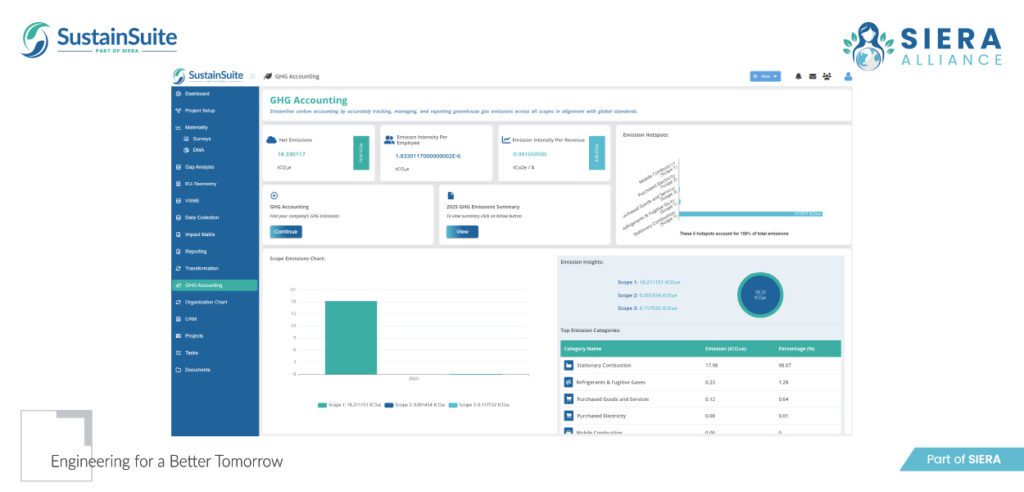In February 2025, the European Commission introduced the Omnibus Simplification Package to streamline the sustainability reporting process for businesses operating in the European Union. With the goal of reducing administrative burdens and enhancing the competitiveness of EU companies against their global counterparts, the Omnibus Package represents a significant shift in how sustainability reporting will be structured and executed.
For businesses, especially those in the EU, understanding these changes is crucial for maintaining compliance and leveraging the opportunities unlocked by sustainability reporting. Let’s explore the key changes introduced by the Omnibus Simplification Package and how SustainSuite can help you adjust to the new requirements.

Key Changes in the Corporate Sustainability Reporting Directive (CSRD)
1. Scope Reduction: Focus on Larger Entities
One of the most significant changes introduced by the Omnibus Package is the scope reduction of the Corporate Sustainability Reporting Directive (CSRD). Under the new regulations, the CSRD will apply only to the largest companies in the EU, significantly reducing the number of businesses subject to the reporting requirements.
New Employee Threshold
The CSRD will now apply to companies with an average of over 1,000 employees. This adjustment means that many smaller businesses will be exempt from these extensive reporting obligations, offering them relief from the complexities of detailed sustainability disclosures.
Financial Thresholds
In addition to the employee threshold, businesses must also meet one of the following criteria:
- Net turnover exceeding €50 million, or
- Balance sheet total above €25 million.
These financial thresholds further limit the number of businesses required to comply with the CSRD. It is estimated that 80% of companies previously under the CSRD’s scope will no longer need to comply with the directive, shifting the reporting obligations onto the largest entities with the most resources.
2. Adjustments for Non-EU Companies
Another important change in the Omnibus Package affects non-EU parent companies. If a non-EU company has an EU turnover of at least €450 million and significant EU-based subsidiaries or branches, it will be required to comply with the CSRD.
This is particularly relevant for multinational corporations with substantial operations in the EU. Large multinational companies will now need to ensure their European branches are adhering to the updated CSRD regulations.
3. Postponement of Reporting Deadlines
The Omnibus Package proposes a two-year delay in the reporting deadlines for certain companies, giving them more time to adapt to the new regulatory requirements. This extension helps ease the transition and ensures that businesses have adequate time to implement the necessary changes in their sustainability practices and reporting processes.
For companies using SustainSuite, this extension provides an opportunity to refine sustainability data collection and reporting workflows, ensuring that your systems are aligned with the new standards well before the new deadlines approach.
4. Simplification of Reporting Requirements
One of the most welcome changes introduced by the Omnibus Package is the simplification of the CSRD reporting requirements. By reducing the number of data points required in sustainability reports, the European Commission aims to ease the burden on companies while still ensuring that critical environmental, social, and governance (ESG) data is disclosed transparently.
SustainSuite has been designed to evolve with the regulations. Our platform allows businesses to automate data collection and generate ESG reports with ease, ensuring compliance while minimizing the manual effort required to compile detailed reports.
5. Voluntary Reporting for SMEs
While many smaller businesses will now be exempt from mandatory reporting due to the raised thresholds, the Omnibus Package also introduces a voluntary reporting standard for non-listed SMEs. This standard, based on the Voluntary Sustainability Reporting Standard (VSME), offers SMEs a simplified approach to sustainability reporting.
Even businesses not mandated to follow the CSRD can use SustainSuite to create a streamlined, voluntary ESG report, giving them a competitive edge by showcasing their commitment to sustainability, helping them attract environmentally conscious consumers and investors.
Changes in the Corporate Sustainability Due Diligence Directive (CSDDD)
The Omnibus Package also brings changes to the Corporate Sustainability Due Diligence Directive (CSDDD). These changes are designed to further reduce the burden on companies while upholding enterprise accountability.
1. Delayed Implementation
The Omnibus Package proposes a one-year delay in the implementation of the CSDDD, with the updated deadline now set for July 26, 2027. This delay gives businesses additional time to adapt their operations and due diligence processes to meet the requirements across their supply chain.
2. Scope Limitation and Frequency of Reviews
Another change in the CSDDD is the scope limitation. Due diligence obligations will primarily apply to a company’s direct business partners, which reduces the need for extensive assessments of the entire supply chain. Additionally, companies will now be required to review their due diligence measures every five years, rather than annually, which further reduces the administrative burden.


Stay Ahead of the Evolving Regulatory Landscape with SustainSuite
Following the amendments put forth by the Omnibus Package, every business stands to benefit from a tailored approach to sustainability reporting. Large enterprises with over 1,000 employees and substantial turnover or balance sheet totals will face the updated CSRD requirements and will need robust software solutions to streamline their reporting processes.
Non-EU companies with significant EU operations are now also required to comply with CSRD reporting. For these companies, SustainSuite offers an integrated solution that enables seamless data collection and reporting, ensuring that global corporations meet EU sustainability standards without the complexity of managing multiple systems.
While many smaller businesses may be relieved from mandatory reporting, those that are part of larger corporate groups or have significant EU operations must stay informed about potential indirect impacts. SustainSuite offers a voluntary reporting option, making it easier for SMEs to adopt sustainable practices and report on their efforts, ensuring they stay competitive in an environmentally responsible marketplace.
SustainSuite, our innovative sustainability reporting software, is fully prepared to help your business navigate these changes, and more, ensuring you stay ahead of the ever-changing regulatory landscape.





